Nottingham Station: 'Five weeks of pain' and how it affects you
- Published
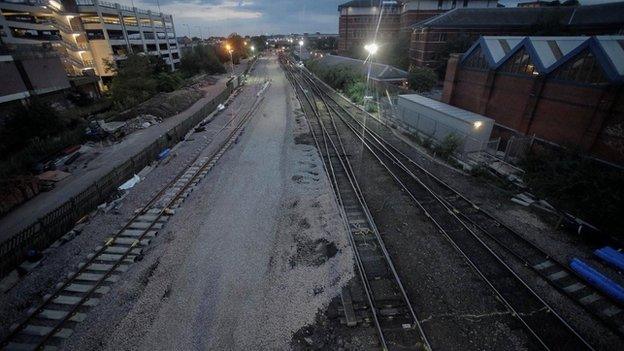
Network Rail said the £100m redevelopment will improve reliability
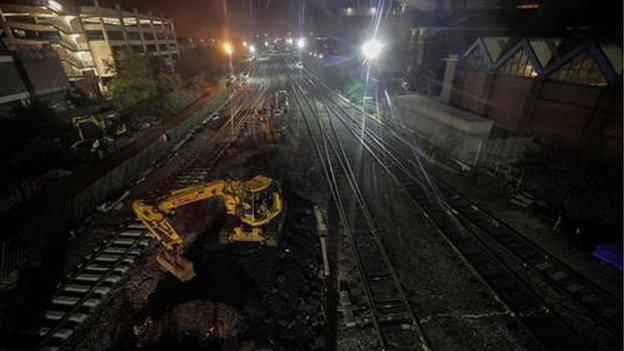
The five-week closure of many services will allow a new platform to be built
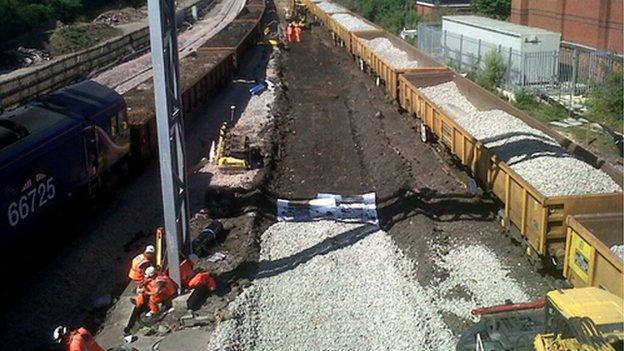
The closures will also allow for the construction of 143 new signals and six miles of new track
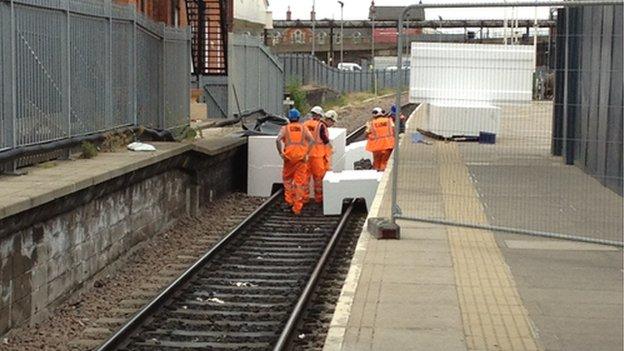
Replacement bus services are being provided while the lines are closed
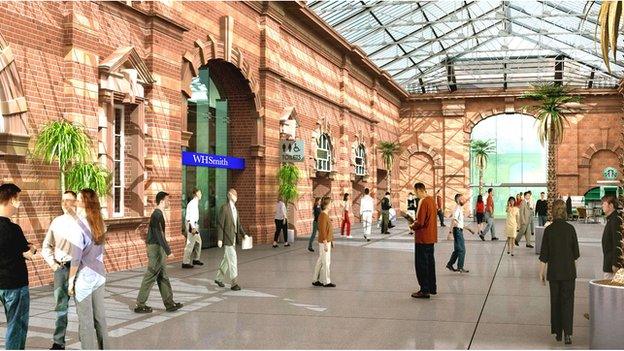
All work on the station is expected to be completed by winter 2014
It has been called a modern transport hub for the East Midlands.
And, according to Network Rail, the £100m redevelopment of Nottingham Station will improve reliability, reduce delays and help it cope with the station's ever-growing number of passengers.
But before then, passengers are enduring what transport groups are calling "five weeks of pain", with most services suspended between 20 July and 25 August.
So what do the closures mean for passengers? And will the gain be worth the pain?
Week five - station set to reopen
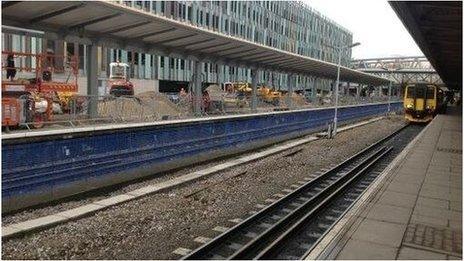
Some services have resumed at the station, which is otherwise closed for maintenance
Network Rail has said it expects there to be "no major problems" as it aims to reopen Nottingham Station on Bank Holiday Monday, as planned.
Services to Skegness and Lincoln, which have resumed after a two-week suspension, will close again on 24 and 25 August, before all services reopen.
"Everything is going well," said a Network Rail spokesperson. "We anticipate no problems with the reopening.
"The project has gone very well so far and we just want to get people off the buses and back on the trains."
Much of the work, which involved laying track, modernising signals and building a new platform, has been completed.
The final week will see the new system tested piece by piece before the station is reopened.
Commuters said they were adjusting to the replacement bus services.
"I would prefer to go by train, but you just have to get on with it," said one woman.
A spokesperson for East Midlands Trains said: "We are really excited about the reopening. The feedback we have had from passengers has been very positive."
Even after the station reopens, work will continue until 2014 to complete the station's new concourse and tram connection.
Why has the station closed?
The station is undergoing two major facelifts - both to the building itself and the tracks and signals.
They are the first large-scale refurbishments to take place there since 1904.
The building redesign has been ongoing since October 2012 and is due to finish in winter 2014.
Nottingham station closes for work
These improvements include a new, refurbished concourse and ticket office and a new station tram stop.
The whole station is also being cleaned and glass panels are being inserted into the platform canopies.
Extensive changes are also being carried out on the station's porch - currently a taxi rank. It will become a passenger walkway with new flooring and cafes.
But most of these very obvious refurbishments have not caused any major difference to services.
Instead, it is the five weeks of "unseen changes" currently taking place - less spectacular refurbishments such as signalling and level crossing improvements - that has seen the station close to all but a few services.
Network Rail claims this work will make a big difference to efficiency.
"Everything from the track to the signals is being dug up and replaced with new and better kit, not just at the station but in both directions," said spokesman Chris Denham.
"That will allow us to run things much more reliably and run everything much more smoothly."
He said the project is running to schedule and the new signalling system in Beeston has been switched on.
All signalling is designed with electrification in mind so disruption will be reduced when the track is upgraded by 2019.
A new platform at Nottingham is also being built.
"The platform will allow us to run more trains, more reliably through this station," added Mr Denham.
How are services affected?
Which trains will be affected by the work at Nottingham Railway station?
During the refurbishments, buses are replacing trains between Nottingham and certain stations, notably East Midlands Parkway, Derby and Mansfield.
"East Midlands Parkway station is the key transport hub for connections to and from Nottingham," said an East Midlands Trains spokesperson.
If you're travelling to London, trains will start and finish at East Midlands Parkway. A replacement bus service to Nottingham operates approximately every 10 minutes. If you want to go to Leicester, you'll have to go from East Midlands Parkway or Loughborough.
In the north, the Robin Hood Line, which runs between Worksop and Nottingham, will be closed for upgrades. Buses are running every 15 minutes from Mansfield to Nottingham - and once an hour between Mansfield and Worksop.
In the east, the route between Liverpool and Norwich is following a diversion and not call at Nottingham or Grantham. All services are instead calling at East Midlands Parkway, where replacement buses will run to Nottingham, Grantham and Newark.
Direct train services are running between Nottingham and Skegness for 23 out of the 37 days of the works, as the period is the seaside resort's busiest time of the year. If you're travelling to Skegness on one of the remaining 14 days, you can catch an hourly bus service between Nottingham and Grantham, with an hourly train service connecting at Grantham for services through to Skegness. There is also an hourly express bus service from Grantham to East Midlands Parkway.
Finally, anyone travelling between Newark Castle and Nottingham can catch a replacement bus, although from 10 August daytime train services between Nottingham and Lincoln will resume. There is also an hourly express bus service between Newark and East Midlands Parkway.
In the west, passengers travelling to Nottingham need to catch replacement buses from Derby or Beeston.
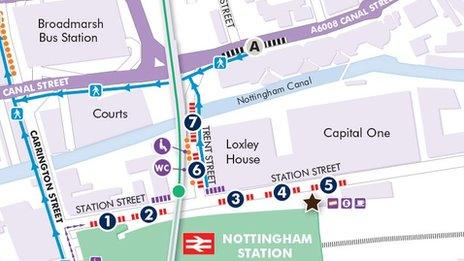
Replacement buses will be located outside Nottingham Station
Bus services from East Midlands Parkway will terminate in Nottingham on Queen's Road, adjacent to the station.
There will be drop-off points around the city centre for rail replacement bus services from Derby, Beeston, Alfreton and Mansfield.
All departures will be from Station Street or Trent Street. The existing taxi rank on Station Street will move to Queen's Road and Trent Street.
A temporary 40mph speed limit on the A453, which connects the city to East Midlands Parkway, will still be in place, although no roadworks will be carried out during that time.
However, East Midlands Trains said any passengers arriving at East Midlands Parkway late as a result of road congestion would be accommodated on other trains.
National Express is adding a further 44 daily coach services to and from Nottingham, with additional services to Gatwick, Heathrow and the East Midlands.
A spokesperson said the coaches' timings would be monitored to try to avoid congestion in the city centre.
"We will be aware of any traffic congestion around the centre and, if necessary, the coaches will be diverted around the city centre to allow them to depart on time," he said.
- Published29 June 2013
- Published20 June 2013
- Published14 July 2012